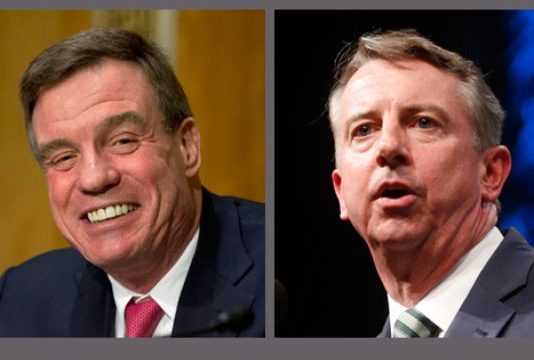‘Radical centrist’ Warner bullish on tax hikes

TAXING QUESTION: Democratic Sen. Mark Warner, left, and GOP challenger Ed Gillespie take opposite tacks on taxes.
By Kenric Ward | Watchdog.org Virginia Bureau
WASHINGTON, D.C. – Sen. Mark Warner, the self-proclaimed “radical centrist,” isn’t so middle-of-the-road when it comes to spending taxpayer dollars.
The Virginia Democrat, seeking re-election this year, received an “F” from the National Taxpayers Union this year.
The NTU ranked his votes on fiscal bills at 14 percent. That’s hardly moderate in a Harry Reid-run Senate where the average score was 42 percent, and where Republicans are in the minority.
Warner’s voting record has been nothing if not consistent. He pulled down two D’s and two F’s in the past four years. His highest score in the NTU rankings was 19 percent.
“Our ratings show Senator Warner may well be a ‘radical centrist’ — radical when it comes to taxing and spending taxpayer dollars, moderate when it comes to saving them,” NTU spokesman Doug Kellogg told Watchdog.org.
One of the most telling, and crucial, votes by the senator was on the Internet sales tax mandate.
Warner co-sponsored the Marketplace Fairness Act, which passed the Senate last year and is now in the House Judiciary Committee, chaired by Rep. Bob Goodlatte, R-Va.
“Votes in favor of MFA were the second most heavily and negatively weighted in our rating,” Kellogg said. It was second only to the continuing budget resolution, which Warner also supported.
MFA would expand state taxing authority beyond state borders, “exposing Virginia businesses to tax regimes in New York, Illinois and California,” Kellogg said.
“Small e-tailers in Virginia would potentially have to comply with over 9,000 different taxing jurisdictions,” he estimated.
“Because predicted revenue from MFA’s passage was included in the big transportation tax hike bill at the state level, Virginians were given a devilish deal where they could either get hit with MFA’s disastrous effects on e-commerce and local online businesses — or have their gas tax increased,” Kellogg explained.
Ed Gillespie, Warner’s Republican opponent in the fall election, derided Warner’s campaign as a bipartisan pose.
“Mark Warner said he would be an independent voice and a pro-business Democrat, but he votes with President Obama 97 percent of the time for job-killing policy after job-killing policy,” Gillespie spokesman Paul Logan said.
“His partisan voting record shows that Mark Warner is not the senator he said he would be.”
Logan said Gillespie supports a balanced budget amendment to the Constitution.
A POX ON BOTH PARTIES: Libertarian Robert Sarvis says Democrats and Republicans represent the parties of big government.
Libertarian candidate Robert Sarvis says neither candidate passes the fiscal test.
Sarvis said Warner’s failing grade “is another strong indicator that he hasn’t been the ‘radical centrist’ he promised.”
But, he added, “If you look back at past NTU scorecards, you can see why Ed Gillespie (former chairman of the Republican National Committee) can’t be trusted to rein in big government.”
“In 2013, the average score for Republican senators was 81, but in 2008, it was just 57, and was never higher than 73 while George W. Bush was office,” Sarvis said.
“The Senate needs leaders who will stand up to bloated budgets, no matter who is in the White House.”
Virginia freshman Sen. Tim Kaine, another self-anointed moderate Democrat, also earned an F grade from NTU. His score was 11 percent.
Neither Warner nor Kaine responded to Watchdog’s requests for comment.
The lowest scoring House member from Virginia was Democratic Rep. Bobby Scott of Norfolk (19 percent).
Two others in the delegation were tied at 20 percent: Rep. Gerry Connolly of Fairfax and retiring Rep. Jim Moran of Arlington.
Kenric Ward is chief of Watchdog.org’s Virginia Bureau. Contact him at kenric@watchdogvirginia.org or at (571) 319-9824. @Kenricward







